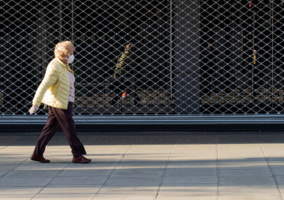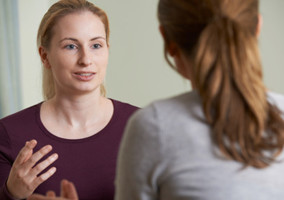For many, it's been an almost unimaginable year of trauma.
A period of disconnection and dislocation that has tested everyone: our year of collective loss. But even bad experience is a good teacher and, as we turn our attention to recovery, we must use, not lose, what we have learned about loneliness.
Spring is in the air and things feel different. Optimism grows and every restriction lifted brings hope of reconnection. But, whilst to some extent loneliness has been a universal experience during lockdown, many fear the isolation will continue even after lockdown is lifted.
Throughout this crisis, the British Red Cross and the Co-op have been supporting an All-Party Parliamentary Group (APPG) of MPs and peers – chaired by Neil O’Brien. They conducted a one-year, in-depth investigation into people’s experiences of loneliness, and together we have used that insight to recommend ways of loneliness-proofing society.
The APPG report A Connected Recovery suggests simple changes to our residential, work and community spaces. It calls for longer-term funding and an end to stop-gap thinking on this critical issue.
It comes at an important point of inflection as the vaccine allows us to imagine the end of social isolation and yet, two-in-five people (39%) who responded to a new Red Cross survey said they do not think their feelings of loneliness will go away after the coronavirus crisis is over.
Two thirds of UK adults told us they were concerned about being able to connect with people in person the way they used to and it’s clear that, even now, some of us need a little more help and, when restrictions relax, there will be further challenges to come.
Throughout the last year, charities like the British Red Cross have been providing some important services to keep people connected.
Our recent Tackling Loneliness Digitally initiative helped more than 2,500 people directly and our online wellbeing resources – designed during the project – reached 100,000 more. It was exciting to see things take shape, especially when our young Generation Digital Volunteers coached more than 500 people to grow their skills and confidence using smart phones and tablets to connect with others. A good number were students. Some were feeling lonely themselves.
What the success of this responsive, innovative project shows is that more needs to be done to support the most isolated, and that starts with improved digital and internet connectivity because every connection matters.
Online or offline, when more than a third of the people we ask (35%) say they feel less connected to their local community than they did before Covid-19, it’s clear we need to do everything we can to prevent loneliness, starting by looking at the world around us.
Twenty-three per cent of people told us their local area doesn’t have good, free public spaces where they can meet up with others once restrictions lift. Many worry barriers to connection will prevent them from being able to get back in touch with the people and places they miss most.
Nearly a third (30%) said simple things like a lack of public toilets, local bus services or accessibility adaptations would prevent them from meeting people in person when coronavirus restrictions lift.
The little things matter
The APPG’s findings mirror our survey and show the little things matter. They can be the difference between being part of a connected community or feeling marginalised and unable to live the life we want for ourselves.
We welcome the call for more joined-up leadership, nationally and locally, and for loneliness and isolation to be factored in, properly, to all our plans when it comes to recovering from this crisis.
At the Red Cross, we work with some of the most vulnerable people in the UK. The pandemic has shown us that particular attention needs to be paid to groups who were already at heightened risk of loneliness before the pandemic and have been hit hardest by the Covid-19 crisis. This includes people with disabilities, those with health conditions and people from Black, Asian and Minority Ethnic backgrounds.
Charities continue to play an important role in helping people connect. Our next step as the Red Cross is to loneliness-proof all our services at design and delivery stage to ensure our spaces and services are accessible, welcoming and encourage people to connect.
But, as the APPG report points out, we will never do more than scratch the surface unless everyone comes with us – that means closer working between national and local government, voluntary and community organisations, and the health and social care sector.
When people are lonely, they’re less confident in their ability to cope and recover.
They’re at greater risk of becoming unemployed and living with long-term disabilities and health conditions. People can be left struggling with a collection of complex challenges that are difficult to unpick – both for them and those trying to help.
We know from our work delivering frontline services this past 150 years that connected communities are more resilient.
Our country needs a connected recovery that brings us all together to prevent the suffering loneliness creates and helps create an environment where we can all thrive.
Zoë Abrams is executive director of communications and advocacy at the British Red Cross
Related articles
Jennifer Allott: Responding to the end of lockdown – what charities can learn from World War One
Jennifer Allott from Age UK York draws on lessons from World War One to look at how the voluntary sector will need to respond to challenges presented by the coronavirus pandemic
Zoë Abrams: How can we support the most vulnerable people as our country recovers?
As lockdown begins to lift, Zoë Abrams from the British Red Cross, looks at the challenges that lie ahead











